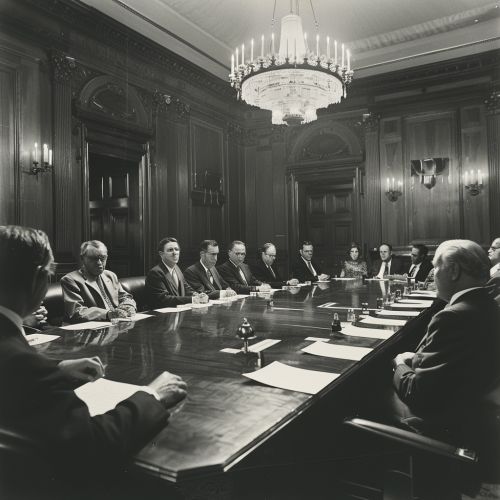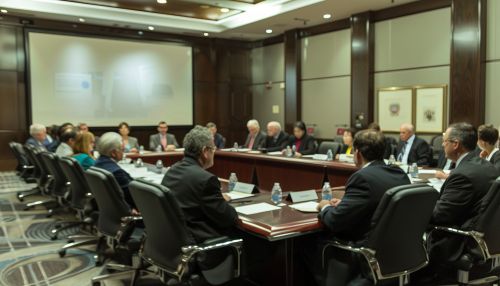Legal Subcommittee
Introduction
The Legal Subcommittee (LSC) is a specialized body within various organizations, including the United Nations Committee on the Peaceful Uses of Outer Space (COPUOS). Its primary function is to address legal issues related to the peaceful exploration and use of outer space. The LSC plays a crucial role in the development of international space law, providing a forum for member states to discuss and negotiate treaties, principles, and guidelines that govern space activities. This article delves into the structure, functions, and significant contributions of the Legal Subcommittee, highlighting its impact on international space law and policy.
Structure and Membership
The Legal Subcommittee is composed of representatives from member states of the parent organization, such as COPUOS. Each member state appoints legal experts to participate in the subcommittee's sessions. The LSC operates under a chairperson, who is elected by the members for a specified term. The chairperson is responsible for guiding the discussions, ensuring adherence to procedural rules, and facilitating consensus among the members.
The subcommittee also includes various working groups and task forces, which focus on specific legal issues. These groups are formed to conduct in-depth studies, draft legal texts, and propose recommendations to the subcommittee. The membership of these working groups is often open to all interested member states, allowing for broad participation and diverse perspectives.
Functions and Responsibilities
The Legal Subcommittee has several key functions and responsibilities, including:
Development of International Space Law
One of the primary functions of the LSC is to develop and refine international space law. This involves drafting and negotiating treaties, principles, and guidelines that govern the activities of states and private entities in outer space. The subcommittee has been instrumental in the creation of major international space treaties, such as the Outer Space Treaty, the Rescue Agreement, the Liability Convention, and the Registration Convention.
Legal Interpretation and Clarification
The LSC also plays a crucial role in interpreting and clarifying existing space law. Member states often seek the subcommittee's guidance on the application and interpretation of specific provisions within international treaties. The LSC provides legal opinions and recommendations to help resolve ambiguities and ensure consistent application of space law.
Promotion of Legal Cooperation
The subcommittee promotes international cooperation in the legal aspects of space activities. It serves as a platform for member states to share their experiences, best practices, and legal frameworks related to space activities. The LSC encourages the harmonization of national space laws and policies, fostering a collaborative approach to addressing legal challenges in space exploration and utilization.
Addressing Emerging Legal Issues
As space activities continue to evolve, new legal challenges emerge. The LSC is tasked with addressing these emerging issues, such as the legal implications of space debris, the use of space resources, and the regulation of private space activities. The subcommittee conducts studies, organizes expert meetings, and develops legal frameworks to address these contemporary challenges.
Major Contributions and Achievements
The Legal Subcommittee has made significant contributions to the development of international space law. Some of its major achievements include:
Outer Space Treaty
The Outer Space Treaty is often considered the cornerstone of international space law. Adopted in 1967, the treaty establishes the fundamental principles governing the activities of states in outer space. It prohibits the placement of nuclear weapons in space, promotes the peaceful use of outer space, and emphasizes the principle of non-appropriation, which states that outer space is not subject to national sovereignty.
Rescue Agreement
The Rescue Agreement, adopted in 1968, outlines the responsibilities of states in the event of an astronaut in distress. It requires states to assist astronauts in distress and return them to their respective countries. The agreement also covers the return of space objects that land on foreign territory.
Liability Convention
The Liability Convention, adopted in 1972, establishes the liability framework for damage caused by space objects. It holds launching states liable for damage caused by their space objects on the surface of the Earth or to aircraft in flight. The convention also provides for the settlement of claims through diplomatic channels or arbitration.
Registration Convention
The Registration Convention, adopted in 1976, requires states to register space objects launched into Earth orbit or beyond. The convention aims to enhance transparency and accountability in space activities by maintaining a central registry of space objects.
Moon Agreement
The Moon Agreement, adopted in 1979, extends the principles of the Outer Space Treaty to the Moon and other celestial bodies. It emphasizes the Moon's use for peaceful purposes and promotes international cooperation in lunar exploration and utilization. However, the agreement has not been widely ratified, with only a few countries being parties to it.


Challenges and Criticisms
Despite its achievements, the Legal Subcommittee faces several challenges and criticisms:
Limited Ratification of Treaties
Some of the treaties developed by the LSC, such as the Moon Agreement, have not achieved widespread ratification. This limits their effectiveness and raises questions about their relevance in the current space environment. The subcommittee continues to encourage member states to ratify and implement these treaties to ensure a comprehensive legal framework for space activities.
Emerging Space Actors
The increasing involvement of private companies and non-state actors in space activities presents new legal challenges. The existing legal framework primarily addresses state activities, and there is a need to develop regulations that govern the activities of private entities. The LSC is actively working on addressing these issues through the development of guidelines and best practices.
Space Debris
The proliferation of space debris poses significant risks to space operations. The LSC is engaged in discussions on the legal aspects of space debris mitigation and remediation. Developing a comprehensive legal framework to address space debris is a complex task that requires international cooperation and consensus.
Utilization of Space Resources
The legal status of space resources, such as minerals on the Moon and asteroids, is a contentious issue. While some countries have enacted national legislation to regulate the extraction and utilization of space resources, there is no international consensus on the matter. The LSC is exploring the legal implications of space resource utilization and seeking to develop a coherent legal framework.
Future Directions
The Legal Subcommittee continues to play a vital role in shaping the future of international space law. Some of the key areas of focus for the subcommittee include:
Development of New Treaties and Agreements
The LSC is exploring the need for new treaties and agreements to address emerging legal challenges in space activities. This includes the development of legal frameworks for space traffic management, the protection of space heritage sites, and the regulation of space tourism.
Strengthening International Cooperation
The subcommittee aims to enhance international cooperation in the legal aspects of space activities. This involves fostering dialogue among member states, promoting the exchange of information and best practices, and encouraging the harmonization of national space laws.
Capacity Building and Education
The LSC is committed to building capacity and promoting education in space law. This includes organizing workshops, seminars, and training programs for legal professionals, policymakers, and students. The subcommittee also collaborates with academic institutions and international organizations to advance the study and practice of space law.
Conclusion
The Legal Subcommittee plays a crucial role in the development and implementation of international space law. Through its efforts, the subcommittee has contributed to the establishment of a robust legal framework that governs space activities and promotes the peaceful use of outer space. As space exploration and utilization continue to evolve, the LSC remains at the forefront of addressing emerging legal challenges and ensuring the sustainable and responsible use of outer space.
